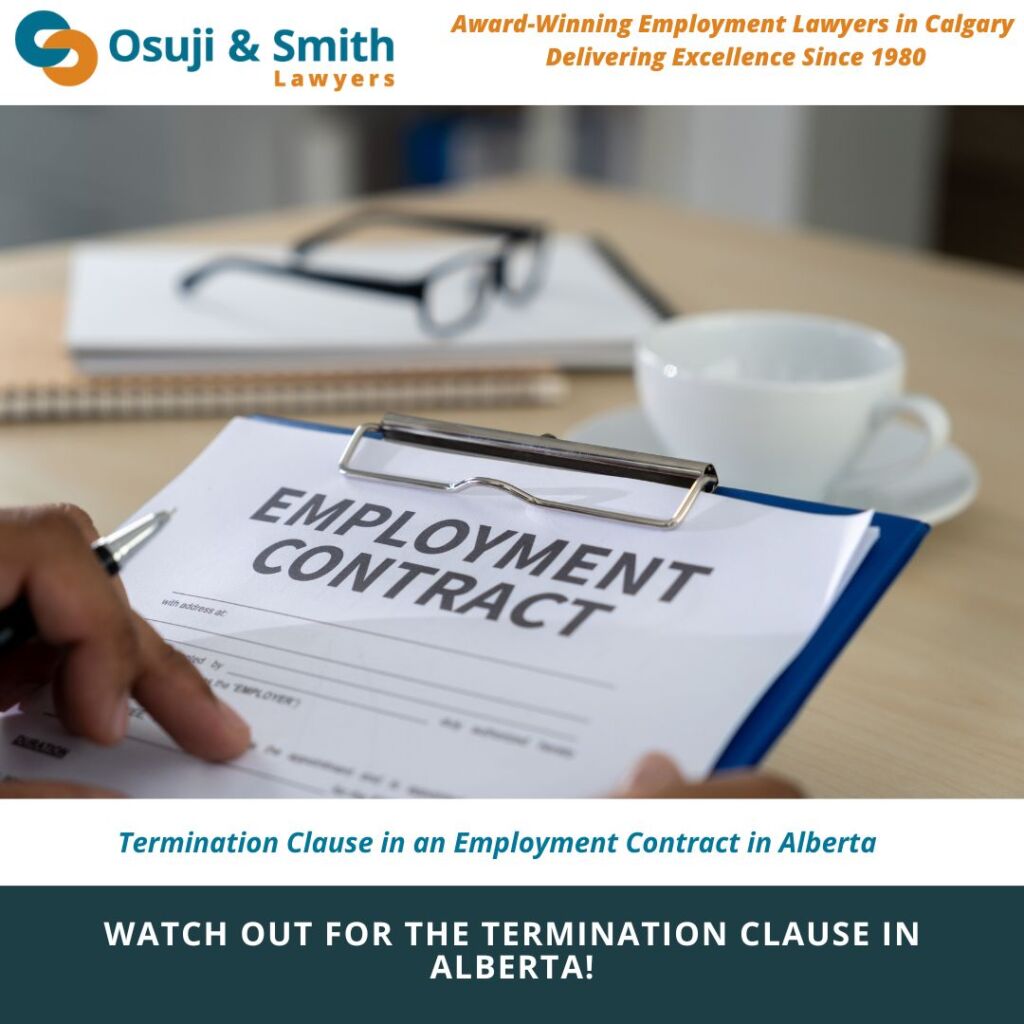Watch Out for the Termination Clause in Alberta! Termination Clause in an Employment Contract
Congratulations! You have secured your dream job! You are excited! And all you want to ask your employer is: “Where do I sign?” But wait! Before you sign, have you thoroughly reviewed the terms and conditions of your Employment Agreement? Particularly the termination clause?
What is the purpose of a termination clause in Alberta?
What is a termination clause?
A termination clause is a provision in the employment contract that defines the rights of the employee at the termination of the employment relationship. It typically determines how much notice period and severance an employee is entitled to when the termination is on a without-cause basis. If an employee is rightfully terminated for cause, though, they are not entitled to compensation.
That is a bit of a party pooper! You have received a job offer; your employer has been effusive in their eagerness to have you join the team; you cannot wait to embark on a new adventure; the pay is great, so the last thing on your mind is probably contemplating the end of a relationship that has only just commenced, and understandably so! However, you should.
Many employment contracts contain a termination clause. So it is essential for an employee to review the termination clause before signing the employment contract. The termination of an employee can be an incredibly traumatic experience for anyone. Making sure the termination clause is not onerous at the onset saves an employee the additional heartache of discovery that it is at the time of termination when they are most vulnerable. So read and understand before you sign. If you do not understand the termination clause, ask questions, and if you need help understanding, ask a lawyer to assist you. Do not accept a gentlemanly, oral agreement. Your employment contract should be in writing, and the terms should be satisfactory to you.
How much notice should an employee receive on termination?

The employer usually drafts the termination clause to benefit the employer and limit the employee’s entitlements at termination to the minimum stipulated by the Alberta Employment Standard Code (“the Code”) or just a little above the minimum. The Employment Standard Code provides that employees are entitled to a minimum amount of notice of one week per year if the employee has worked for more than 90 days and less than two years. For more than two years and less than 4 years, the employee is entitled to two weeks’ notice. For a full list, go to the link https://kings-printer.alberta.ca/documents/Acts/E09.pdf
However, that is not all; in common law, the employer is required to pay more than the minimum mandated by statute. So, in addition to the minimum required by statutes, the court considers other factors like the employee’s age, length of service to the employer, areas of specialization and ability to find another employment and awards more notice period accordingly.
For long-term employees, this can be a lot of money, and employees have been granted 24 months’ salary in lieu of notice. However, to avoid making big payouts, many employers insert termination clauses that expressly exclude common law entitlement for the employee. If that is the case, you may work for 10 years and realize that you are only entitled to 8 weeks’ notice and nothing more meanwhile, with common law, you could have been entitled to 10 months or more. Let it be your decision that you are accepting a termination pay with such limitations. You do not want to be blindsided and have to fight your employer after termination.
There are instances where a termination clause is not enforceable. Amongst those instances are when the language of the clause is ambiguous; it limits the employee’s statutory minimum entitlement; it is unreasonable or harsh; the clause is not in the employment contract itself but somewhere else like the staff manual; the employer made the employee sign the termination clause after they started work, and it was not brought to their attention; the employer threatened the employee to sign or be fired, and so on.
If you have been terminated and your notice is less than satisfactory, please get in touch with Osuji & Smith employment lawyers to review the enforceability of your termination clause. Get the severance pay that you deserve!
Conclusion
Most importantly, before you sign that employment contract, ensure that your termination clause is favorable. It may be akin to the discomfort one gets discussing divorce terms when you only just got engaged to be married! Do it anyway, not the divorce terms, (that’s up to you), the termination clause!
If you have been terminated and need to know if your termination clause is enforceable or need more information about this topic or any other employment matter, please get in touch with our TOP Calgary employment lawyers. We are here to help!
Author: Juliette Omonigho

